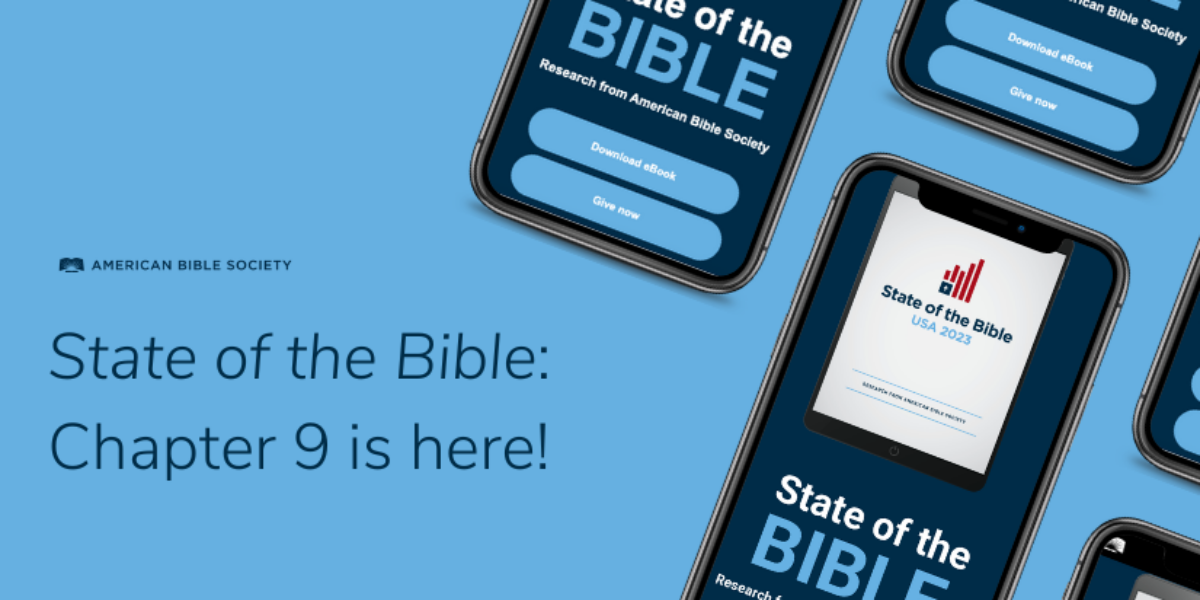American Bible Society today released the ninth and final chapter of their 13th annual State of the Bible report, which highlights cultural trends in the U.S. regarding spirituality and Scripture engagement. This year’s study shows that while overall Bible engagement in the United States continues to decline, signs of hope among certain segments of the population—including black Christians, Gen Z, and even non-Christians—signal a powerful opportunity for revival. To download the complete State of the Bible 2023 report ebook—including a special new section on trauma and hope—visit StateoftheBible.org.
“Some people see the State of the Bible report as a scoreboard, showing the ups and downs of faith, church involvement, and Bible reading. We prefer to see it as a group photo, showing the character of different segments of the American population,” said John Farquhar Plake, PhD, American Bible Society’s Chief Ministry Officer. “This year’s data revealed that black Christians lead the way on most measures of spiritual health; that online church attenders show higher levels of Scripture Engagement and generosity; and that non-Christians have a strong sense of morality on many social issues. The need for meaningful, life-changing interaction with the Bible in our society is greater than ever, but leaders can maximize their ministry by tuning in to the unique character of each group in their communities.”
State of the Bible findings come from a nationally representative survey performed for American Bible Society by NORC at the University of Chicago, using their AmeriSpeak panel. The data came from 2,761 online interviews with American adults in all 50 states and the District of Columbia.
Key findings from 2023 analyzed in Chapter 9: What We’ve Been Learning
- While only a quarter of the U.S. population (25%) reads the Bible weekly on their own outside of a church service, more than half of Americans (52%) say they wish they read Scripture more. One in seven Americans (14%) say they’ve increased their Bible reading in the past year (page 174).
- Online church attenders are more than twice as likely to connect with Scripture on their own at least once a week. While fewer than a third of in-person church attenders (32%) report weekly Bible use on their own, that number soars to nearly three in four (74%) for online attenders (page 177).
- More than half of Gen Z adults ages 22–26 (52%) say their lives have been “transformed by the Bible’s message” (slightly more than the younger group, ages 18–21). Those who identify as Christians show slightly higher scores on the Spiritual Vitality Gauge than the younger group, suggesting that those who remain in the faith are growing in it (page 180).
- Among all ethnic groups, black Americans (38%) are far more likely to read the Bible weekly than individuals from other backgrounds (all others, 23% combined). Nearly one in five black Americans (19%) use the Bible every day, again far outpacing those of all other groups (8% combined) (pages 136, 182).
- While three out of five Americans (61%) follow the faith tradition that was practiced by their parents during childhood, those whose faith has changed have slightly higher Scripture Engagement scores. They are more likely to trust the Bible and to consider their current faith “very important in my life today” (pages 24, 185).
To download the complete State of the Bible 2023 report and explore all the Top Data Stories of 2023 contained in Chapter 9, along with the special section on hope and trauma, visit StateoftheBible.org.
*For descriptions on how Scripture engagement was measured and reported, please see page 191 of the ebook available for download at StateoftheBible.org.





